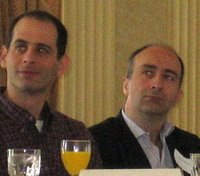 And now for a more leisurely report on my weekend at Grub Street's 2006 "Muse and the Marketplace Conference":
And now for a more leisurely report on my weekend at Grub Street's 2006 "Muse and the Marketplace Conference":(For more information and the full 2006 program, including brief descriptions of the many workshops I was not able to attend, click here. By the way, until I figure out how to include captions with the photos you'll have to bear with me. For the curious, the photo to the right shows Michael Lowenthal and James Wood listening to Grace Paley at the Sunday Keynote Brunch. And if any of you have tips on how to manage such captions [is this something managed through Blogger or through my beleaguered-and-outdated iPhoto program?] please tell me!)
My Saturday highlights included sessions led by Matthew Pearl ("The Thrill of History") and the aforementioned Michael Lowenthal ("Clockwatchers: Time Management in Fiction"). Pearl's workshop featured plenty of lively audience discussion on historical fiction: what it is, how we write it, how we read it, what "ethics" may (or may not) apply in working within this field. Pearl also treated us to the first public reading from his new novel, The Poe Shadow. That's definitely going on my to-read list.
For Lowenthal's workshop, we'd been e-mailed a reading assignment in advance (this is perhaps a good moment to mention that Grub Street's conference is exceedingly well-organized). On Saturday, Lowenthal offered an exceptionally detailed close reading of a chapter from Richard Yates's Revolutionary Road to illustrate how a fiction writer can employ chronology as a tool in the fiction "toolbox." And guess what? We need not rely solely on our beloved space breaks! There are other ways to go back and forth in time in fiction.
Why is this important? Because these shifts, as we saw in the careful analysis of the Yates novel excerpt, can add so much richness to our understanding of a character's goals and emotions. (The second reading assignment, by the way, was an excerpt from Alice Munro's story, "Chance," in the Runaway collection.)
For me, Lowenthal's workshop was followed by a meeting with an agent in the "Manuscript Mart." The Manuscript Mart was also conducted really well--Grub "officials" enforced time limits and the agent with whom I met had, indeed, received the materials I'd forwarded through Grub. Even better, she'd enjoyed what I'd sent!
Sunday's program began, in my case, with James Wood's very smart session on "How to Narrate." It was wonderful to hear Wood read--in his British accent--from two Henry James novels. Frankly, as soon as I saw that Wood had given us handouts of James excerpts I knew it would be a seminar I'd like. Since I've fairly recently read What Maisie Knew (I took the reading suggestion from Brian Kiteley's points about this book [a divorce story told from a child's perspective] in The 3 A.M. Epiphany), I was particularly interested to hear Wood's comments on that work. But the overall point Wood seemed to emphasize was how a third-person point of view can afford a great freedom. (I've always thought so. I usually don't write fiction in the first-person and have sometimes wondered why it really does seem to appeal to so many writers so often.)
After the morning sessions everyone gathered for the keynote brunch. Grace Paley read from her work and answered questions on the topic of "writers as agents of social change." She read fiction (a short story titled, "Wants"); nonfiction (an utterly amazing piece--perhaps even more powerful read aloud by the author than it would be on the page, but I haven't yet tracked it down to find out for certain) called "Three Days and a Question"; a piece she described as between fiction and nonfiction (I didn't catch the title!); and a poem titled "Responsibility." (You can read this poem, albeit somewhat piecemeal, here.)
It was all pretty riveting.
Overall, it was a terrific conference. Congratulations to Grub Street on (another) job very well done!


No comments:
Post a Comment